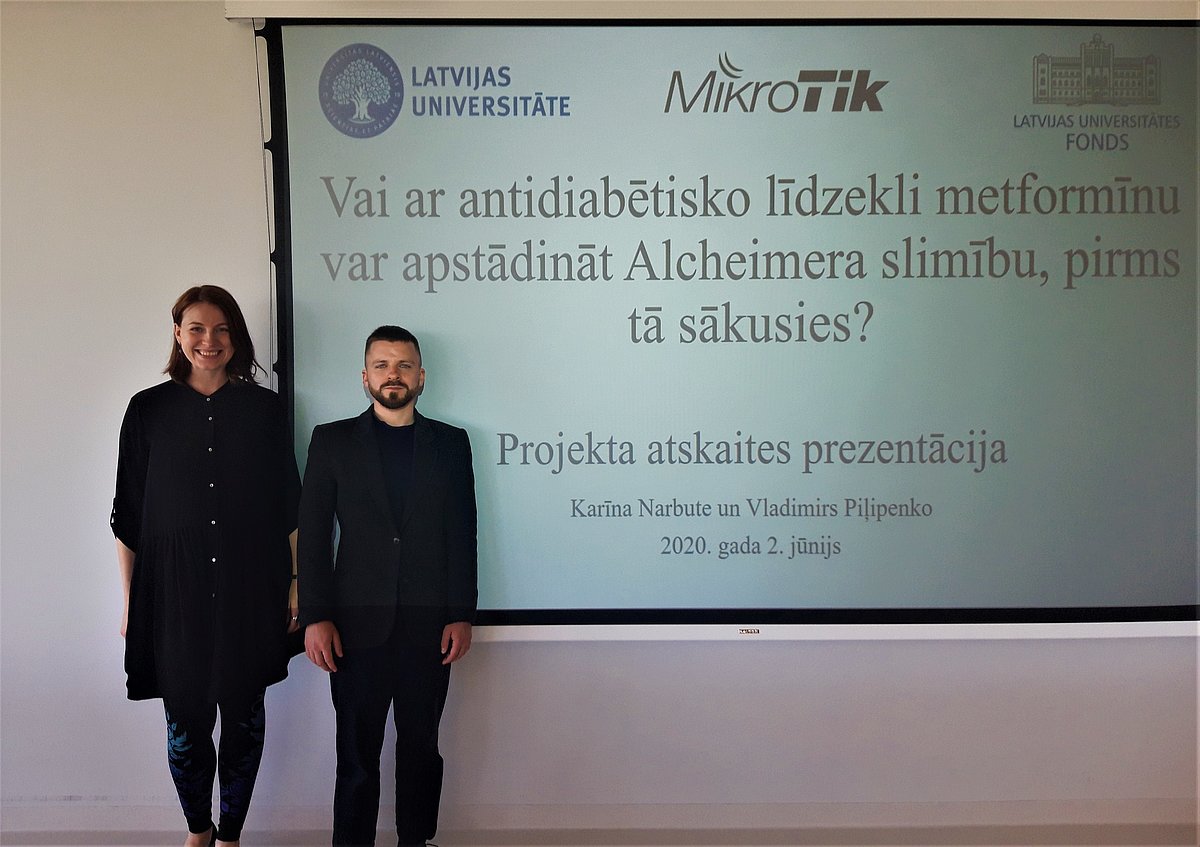
As the average life expectancy of the world's population increases, so does the prevalence of age-related chronic diseases, causing both social and economic burdens. Dementia-related diseases are the third leading cause of death in Europe, but treatment options for these neurodegenerative illnesses remain limited.
Finding new regularities, the researchers of the Department of Pharmacology of the UL Faculty of Medicine, Dr. med. Vladimirs Piļipenko and doctoral degree candidate Msc.pharm. Karīna Narbute is now a step closer to understanding the mechanisms of this disease. The aim of the UL Foundation-administered project was to investigate whether and how the antidiabetic drug metformin improves neuronal processes in sporadic Alzheimer's disease animal models. It is known that 95–99 % of Alzheimer's disease has a sporadic origin, i.e., its causes are unknown, but the illness may be caused by oxidative stress, altered glucose metabolism in the brain, changes in gene expression, insulin resistance, neuroinflammation or a combination of all these processes.
Curbing in early stages
Dementia is a syndrome present in a number of multifactorial neurodegenerative diseases and the development is an irreversible process. Existing therapies do not stop the progression of dementia-related diseases, side effects can occur and the therapies are not effective in all patients. Only in 1–5 % of the cases the disease is genetically inherited.
Alzheimer's patients suffer from memory loss, social dysfunction, and general impairment, but in sporadic Alzheimer's disease, the onset of pathological processes may begin decades before the emergence of clinical symptoms. In addition, sporadic Alzheimer's disease is closely linked to type 2 diabetes. Patients with type 2 diabetes are known to be 40 % more likely to develop dementia, and 80 % of Alzheimer's patients have insulin resistance or type 2 diabetes.
Over the last 10 years, antidiabetic drugs have been widely studied as potential means of controlling the incidence of dementia, exploring their capacity to arrest the disease before it starts, curbing it in the prodromal phase. This opens up the possibility of using disease-modifying therapies. Metformin is derived from guanidine, which is sources from natural material and is a widely used hypoglycaemic agent for the treatment of type 2 diabetes.
Metformin is found to have a protective effect
“Brain diabetes was imitated in laboratory animals by modelling the changes. 14 days after the administration of the toxin, the hippocampus, more precisely, the area of the brain responsible for memory formation and processing, showed a protective effect,” explains the head of the project, Dr. med. Vladimirs Piļipenko.
Results of the study show that the use of metformin:
- improves sociability – ability and willingness to communicate;
- protects spatial memory processes;
- stops neuroinflammation;
- maintains cerebral glucose uptake and transport;
- retains synaptic plasticity.
The project implementation team brought together the University of Latvia and Riga Stradiņš University students. The team aspires to continuing the studies of metformin’s neuroprotective potential and will seek additional funding for this research.
About the University of Latvia Foundation
Since 2004, the UL Foundation provides an opportunity to patrons and cooperation partners to support both the University of Latvia and other leading higher education institutions of our country, thereby investing in the future of Latvia. The priorities of the UL Foundation are to support the most outstanding, dedicated students and researchers, to advance creation of a modern study environment, as well as to promote construction and refurbishment of university’s buildings.

 Academic Centre
Academic Centre
